Dua Qunoot is a dua to be recited in the Witr prayer. You will be surprised to know that most of the Muslims do not know about the correct Dua Qunoot which should be recited in Witr Prayer.
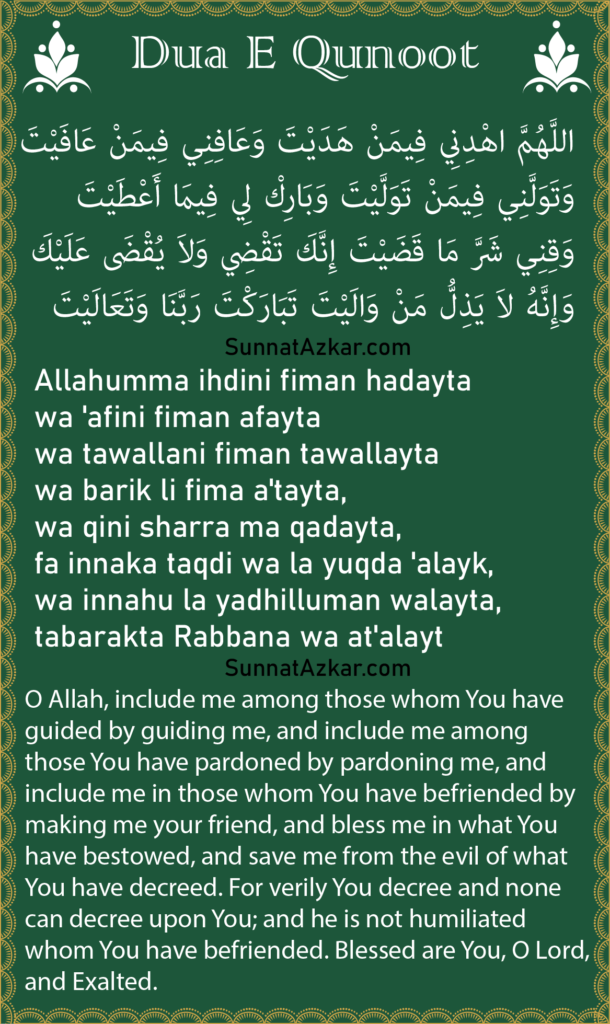
Agar ap Dua e Qunoot ko hindi me padhna chahte hai to yaha click kar ke hamara post padh sakte hai.
Table of Contents
is dua qunoot compulsory for witr?
Dua Qunoot is not compulsory for the completion of Witr prayer, and whoever prays witr without reciting Dua Qunoot does not need to worry about its acceptance as to recite Dua Qunoot is merely an occasion Allah has given us to supplicate in Witr prayer.
And once you read the meaning of Dua Qunoot, you would never want to leave this occasion to recite Dua Qunoot and secure the blessings of this world and hereafter by doing that.
What is Qunoot e Naazilah?
When most of the muslims perform Witr prayers, the dua which is recited as Dua Qunoot is not actually Dua Qunoot but Qunoot e Naazilah (Allahumma inna Nastainuka…). These two Dua are different.
The Dua of Qunoot e Naazilah was recited to curse the infidels of Najd, because of the merciless cruelty they did, you can read about the whole incident by clicking here.
Qunoot e Naazilah can be recited either in Witr or after the bowing in the last rak’at of Obligatory prayers, remember that this is Qunoot e Naazilah, not Dua Qunoot.
Which Dua Qunoot is correct?
The Correct Dua Qunoot to be recited everyday in witr prayer is the one which Prophet Muhammad (ﷺ) has taught us as Qunoot e Witr, which you can read about in the hadees mentioned below:
Hadees:
It was narrated that Abu Al-Jawza said:
“Al-Hasan said: “The Messenger of Allah (ﷺ) taught me some words to say in witr in Qunoot:
اللَّهُمَّ اهْدِنِي فِيمَنْ هَدَيْتَ وَعَافِنِي فِيمَنْ عَافَيْتَ وَتَوَلَّنِي فِيمَنْ تَوَلَّيْتَ وَبَارِكْ لِي فِيمَا أَعْطَيْتَ وَقِنِي شَرَّ مَا قَضَيْتَ إِنَّكَ تَقْضِي وَلاَ يُقْضَى عَلَيْكَ وَإِنَّهُ لاَ يَذِلُّ مَنْ وَالَيْتَ تَبَارَكْتَ رَبَّنَا وَتَعَالَيْتَ
Allahumma ihdini fiman hadayta wa ‘afini fiman afayta wa tawallani fiman tawallayta wa barik li fima a’tayta, wa qini sharra ma qadayta, fa innaka taqdi wa la yuqda ‘alayk, wa innahu la yadhilluman walayta, tabarakta Rabbana wa at’alayt.”
Translation:
O Allah, include me among those whom You have guided by guiding me, include me among those You have pardoned by pardoning me, include me in those whom You have befriended by making me your friend, and bless me in what You have bestowed, and save me from the evil of what You have decreed. For verily You decree and none can decree upon You; and he is not humiliated whom You have befriended. Blessed are You, O Lord, and Exalted.
Reference : Sunan an-Nasa’i 1745
What to recite in witr if you don’t know dua qunoot?
Dua Qunoot is something we must learn. There are very few people in the world who remember Dua Qunoot. So we must learn this dua which the Prophet of Allah (ﷺ) has recommended to recite in the Witar prayer.
Now the question arises that if we do not know Dua Qunoot then what should we recite?
So the simple answer is that Dua Qunoot is a dua, and if someone does not remember this dua by heart then he should recite some other dua. Because only a dua can be recited in place of a dua. Until you are unable to recite Dua Qunoot by heart, you can recite these dua instead of Dua Qunoot:
رَبَّنَا آتِنَا فِي الدُّنْيَا حَسَنَةً وَفِي الآخِرَةِ حَسَنَةً وَقِنَا عَذَابَ النَّارِ
Rabbanā ātinā fid-dunyā ḥasanah wa fi ‘l-ākhirati ḥasanah wa qinā `adhāban-nār.
This dua can be found in Sahih Muslim, the link for this dua is given below, you can crosscheck this hadees by clicking on the link and read it by yourself.
Hadees:
Anas reported that Allah’s Messenger (ﷺ) used to supplicate (in these words):
رَبَّنَا آتِنَا فِي الدُّنْيَا حَسَنَةً وَفِي الآخِرَةِ حَسَنَةً وَقِنَا عَذَابَ النَّارِ
” Our Lord, grant us the good in this world and the good in the Hereafter and save us from the torment of Hell Fire.”
Reference : Sahih Muslim 2690b
Here, some of our brothers have this misconception that if they do not remeber Dua Qunoot by heart then they can read Surah Ikhlas instead, well, you can not, because it is not so. Brothers, Dua Qunoot is a dua and till you do not get it, you need to recite another dua to replace it and hence the dua taught by our Prophet (ﷺ) has been given above, you should recite only that.
What to Recite After Dua Qunoot?
Qadi ismail Maliki al mutawaffa 287 hijri has written the book named fadlus-salat al-an-nabee. In this book, you will find narrations with proper chain of narrators mentioning that the companions of Prophet Muhammad (ﷺ) and the ones that came after them, used to recite durood shareef after reciting Dua Qunoot.
اللَّهُمَّ صَلِّ عَلَى مُحَمَّدٍ وَعَلَى آلِ مُحَمَّدٍ
You are not required to recite the complete durood e ibrahim, it is well and good if you do it but you can also say only “Allahumma Salli ‘Ala Muhammad Wa ‘Ala Aali Muhammad” this part of the durood e ibrahim, and it is also considered as a complete durood shareef. You can know more about it by reading the hadees mentioned below.
Hadees:
It was narrated that Musa bin Talha said:
“I asked Zaid bin Kharijah who said: ‘I asked the Messenger of Allah (ﷺ) and he said: Send salah upon me and strive hard in supplication, and say:
اللَّهُمَّ صَلِّ عَلَى مُحَمَّدٍ وَعَلَى آلِ مُحَمَّدٍ
Alahumma salli ‘ala Muhammad wa ‘ala ali Muhammad (O Allah, send salah upon Muhammad and upon the family of Muhammad).'”
Reference : Sunan an-Nasa’i 1292
Should you recite Dua Qunoot in witr prayer before bowing or after bowing?
Dua Qunoot should be recited in the last Rak’at of Witr, before bowing. Below you can read the Hadees of Sahih Bukhari in which this thing will become more clear to you.
Hadees:
Narrated `Asim:
I asked Anas bin Malik about the Qunoot. Anas replied, “Definitely it was (recited)”.
I asked, “Before bowing or after it?”
Anas replied, “Before bowing.”
I added, “So and so has told me that you had informed him that it had been after bowing.”
Anas said, “He told an untruth (i.e. “was mistaken,” according to the Hijazi dialect). Allah’s Messenger (ﷺ) recited Qunoot after bowing for a period of one month.” Anas added, “The Prophet (ﷺ) sent about seventy men (who knew the Qur’an by heart) towards the pagans (of Najd) who were less than they in number and there was a peace treaty between them and Allah’s Messenger (ﷺ) (but the Pagans broke the treaty and killed the seventy men). So Allah’s Messenger (ﷺ) recited Qunoot for a period of one month asking Allah to punish them.”
Reference: Sahih al-Bukhari 1002
How to Pray Witr Prayer?
Witr prayer, which is also called the night prayer, is normally offered in 3 rak’at. These 3 Rak’at have to be performed in a different way from the 3 Rak’at of Maghrib prayer, which will be confirmed from the upcoming Hadees Sharif.
There are 2 Ways to perform Witr Prayer:
Perform 2 rak’at prayer and do salutations then pray 1 rak’at separately and thus conclude the 3 rak’at. Or,
You can perform 3 rak’at in continuation, but you have to skip tashahhud in the 2nd rak’at. In the 2nd rak’at after 2nd prostration, without sitting in tashahhud, you should stand up for the 3rd rak’at and thus complete the 3 rak’at.
Hadees:
Narrated `Abdullah bin `Umar:
The Prophet (ﷺ) said, “Night prayer is offered as two rak`at followed by two rak`at and so on, and if you want to finish it, pray only one rak`a which will make all the previous rak`at Witr (Odd).” Al-Qasim said, “Since we attained the age of puberty we have seen some people offering a three rak`at prayer as witr and all that is permissible. I hope there will be no harm in it.”
Reference : Sahih al-Bukhari 993
Nafi` told that `Abdullah bin `Umar used to say Taslim between (the first) two Rak`at and (the third) odd one in the Witr prayer, he was even used to attend to a certain matter (during that interval between the Rak`at).
Reference : Sahih al-Bukhari 991
When do you recite Dua Qunoot in Witr Prayer?
When you are praying 3 Rak’at Witr and you are in the third Rak’at, or if you are praying 1 Rak’at Witr, in both cases, you can do as mentioned below:
After Reciting Surah Fatiha and adding another surah after that, you can recite dua qunoot straight away.
Or, After reciting Surah Fatiha and reciting another surah after that, you can raise both your hand, say Allahuakbar, and keep them again like they were before, and recite dua qunoot.
It is proven that Hazrat ‘Umar radi. Used to raise his hands (rafa dayn) before reciting dua qunoot. (Musannaf Ibn Abi Shayba: 7021-25)
Should you keep your arms outstretched while reciting Dua Qunoot, like you do when you supplicate?
Just as one raises one’s hand while supplicating Dua, one should not raise one’s hand in the same way while reciting Dua Qunoot because Prophet Muhammad (ﷺ) did not raise his hand while reciting Dua Qunoot, but one should raise one’s hand while reciting Qunoot Naazilah. This matter will become more clear from the Hadees mentioned below.
Hadees:
Narrated Abdullah ibn Abbas:
The Messenger of Allah (ﷺ) recited the supplication (Qunoot) daily for a month at the noon, afternoon, sunset, night and morning prayers. When he said: “Allah listens to him who praises Him” in the last rak’ah, invoking a curse on some clans of Banu Sulaym, Ri’l, Dhakwan and Usayyah, and those who were standing behind him said: Amen.
Reference : Sunan Abi Dawud 1443
There is one hadees in Juz Al Rafa ul Yadain, a book written by Imam Bukhari who also wrote Sahih Bukhari, In that hadees, it is mentioned that Hazrat ‘Umar radi. Used to lift his hands after bowing and recite qunoot e naazilah,while he was leading the prayer.
The english version of the book is not easily found on the internet, but here is the link of an arabic/urdu version.
Share the blessings: Share SunnatAzkar.com with your Family and Friends
We hope that we have answered all your questions regarding Dua Qunoot. You yourself should also learn this Blessed supplication, the recitation of which has been taught by the Holy Prophet (ﷺ) himself, and you should also recite it to your friends, loved ones and loved ones so that they become a source of reward for you.
There is no need to worry at all in doing so, because We believe that the blessings of Dua, Azkar, and Hadith should be accessible to all with absolute precision. At SunnatAzkar.com, we’re dedicated to providing you with meticulously verified and error-free content, ensuring that you receive the guidance and knowledge you seek.
Now, you can be a part of this noble mission. Share this post with your friends, family, and acquaintances. By doing so, you’re not only helping them access authentic Islamic content but also earning unending rewards from Allah, the Most Merciful.
In a world filled with information, let’s make sure the knowledge that truly matters reaches every corner. Spread the word about SunnatAzkar.com, where faith meets authenticity.
May your sharing be a source of guidance and blessings for all, and may your efforts be rewarded abundantly by the Most High.

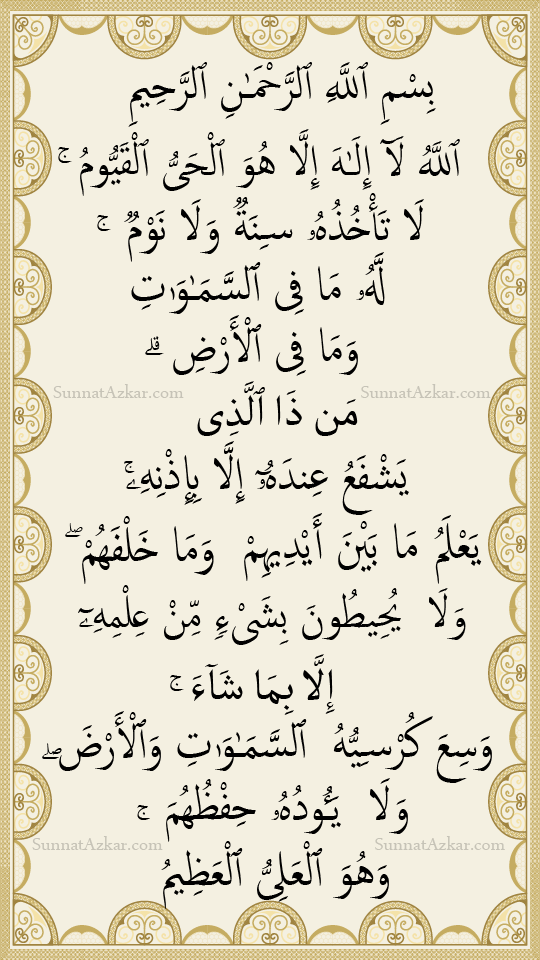
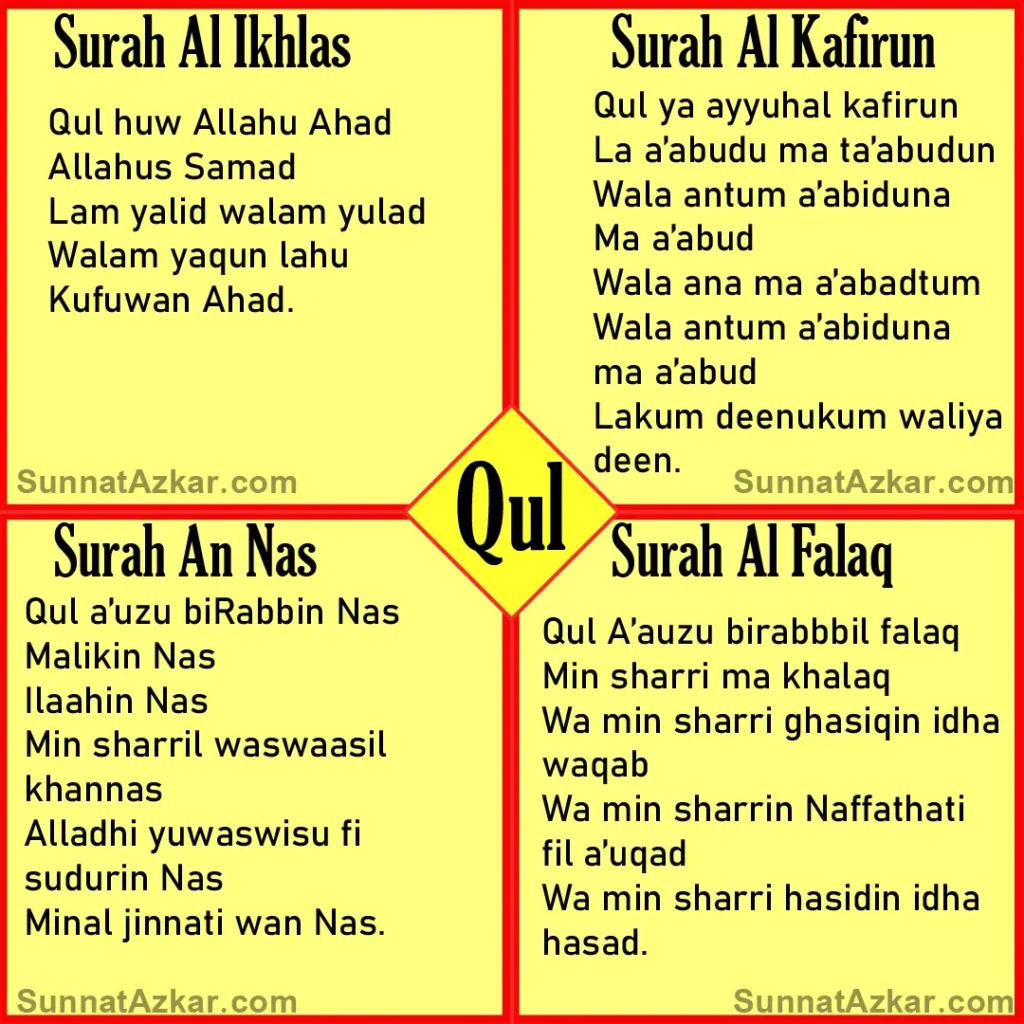
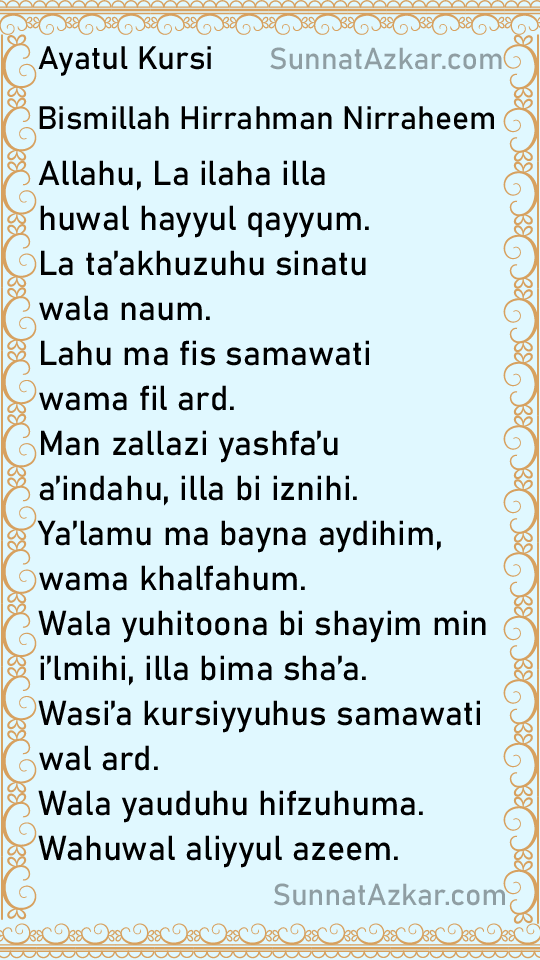
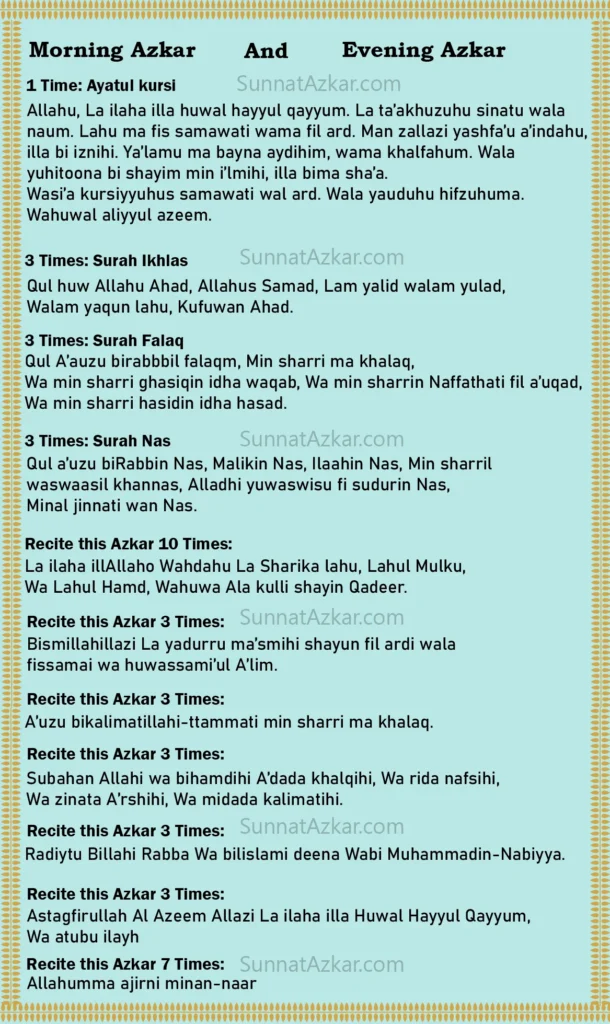
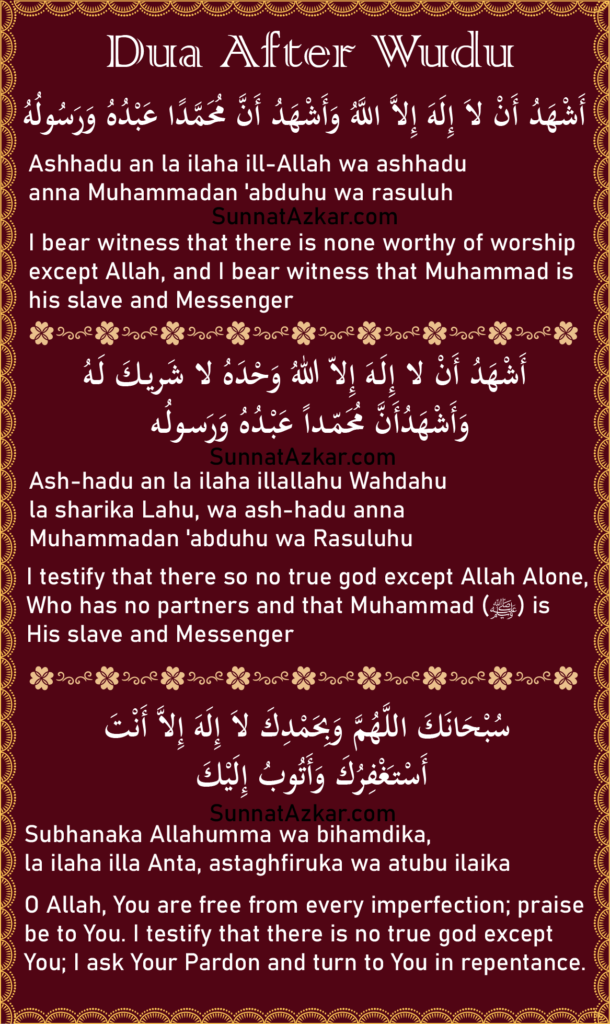
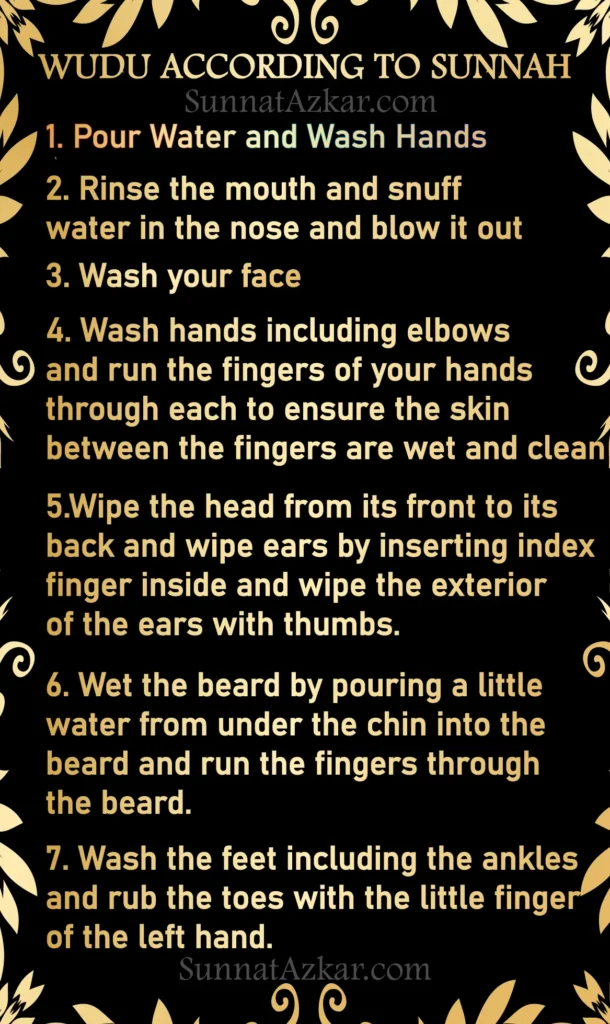

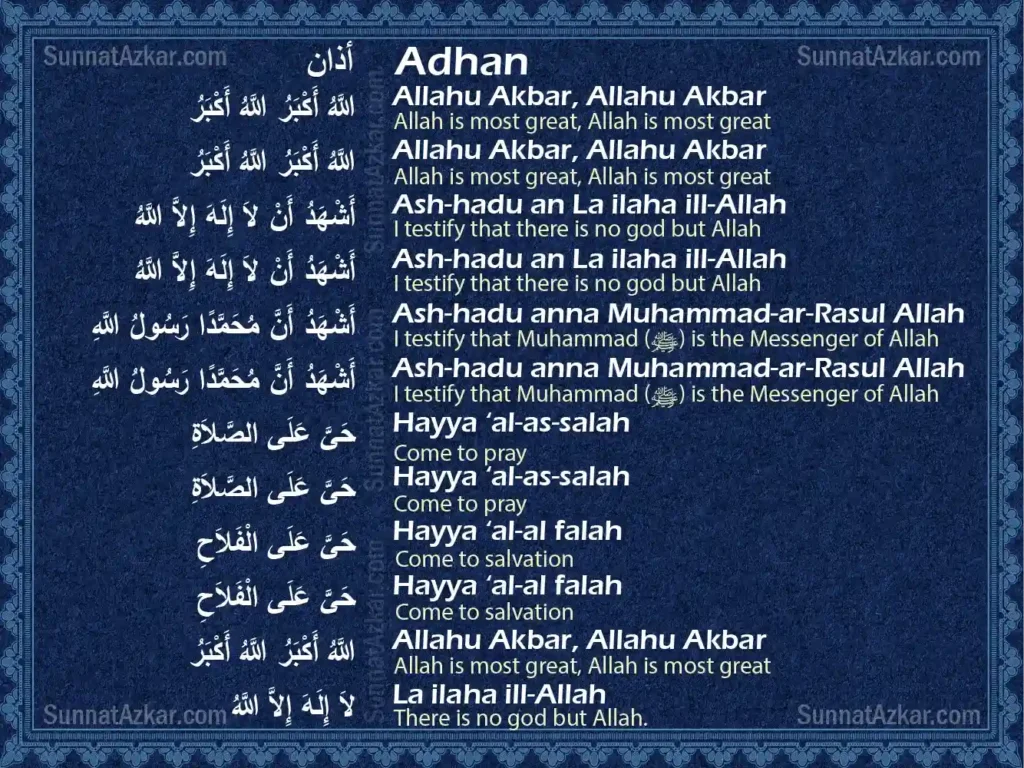
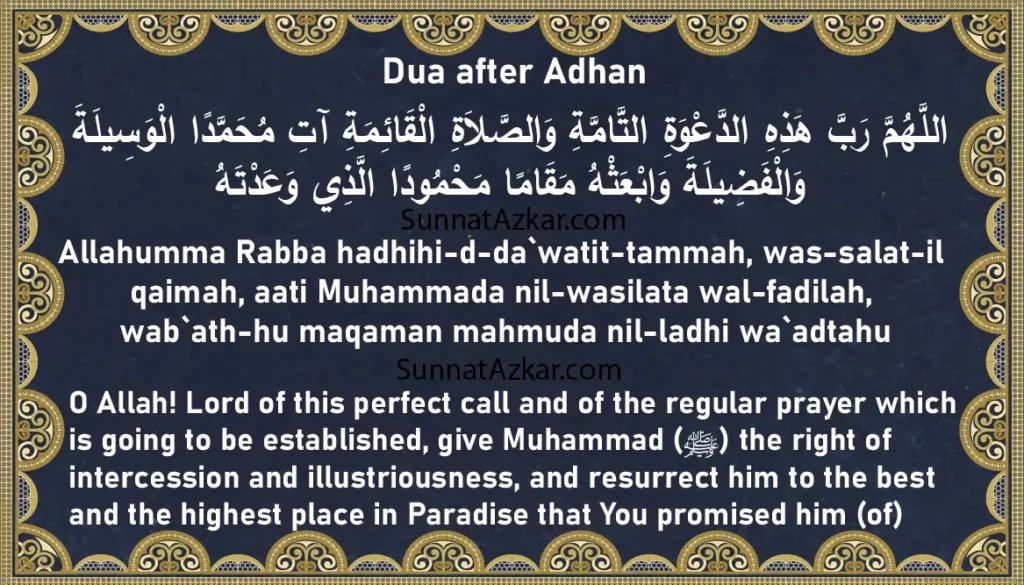
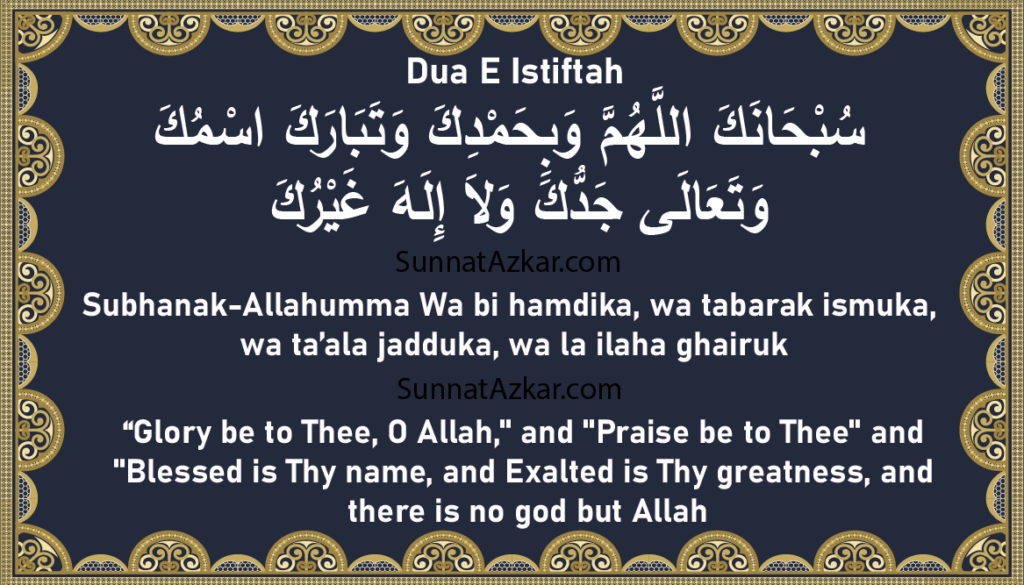

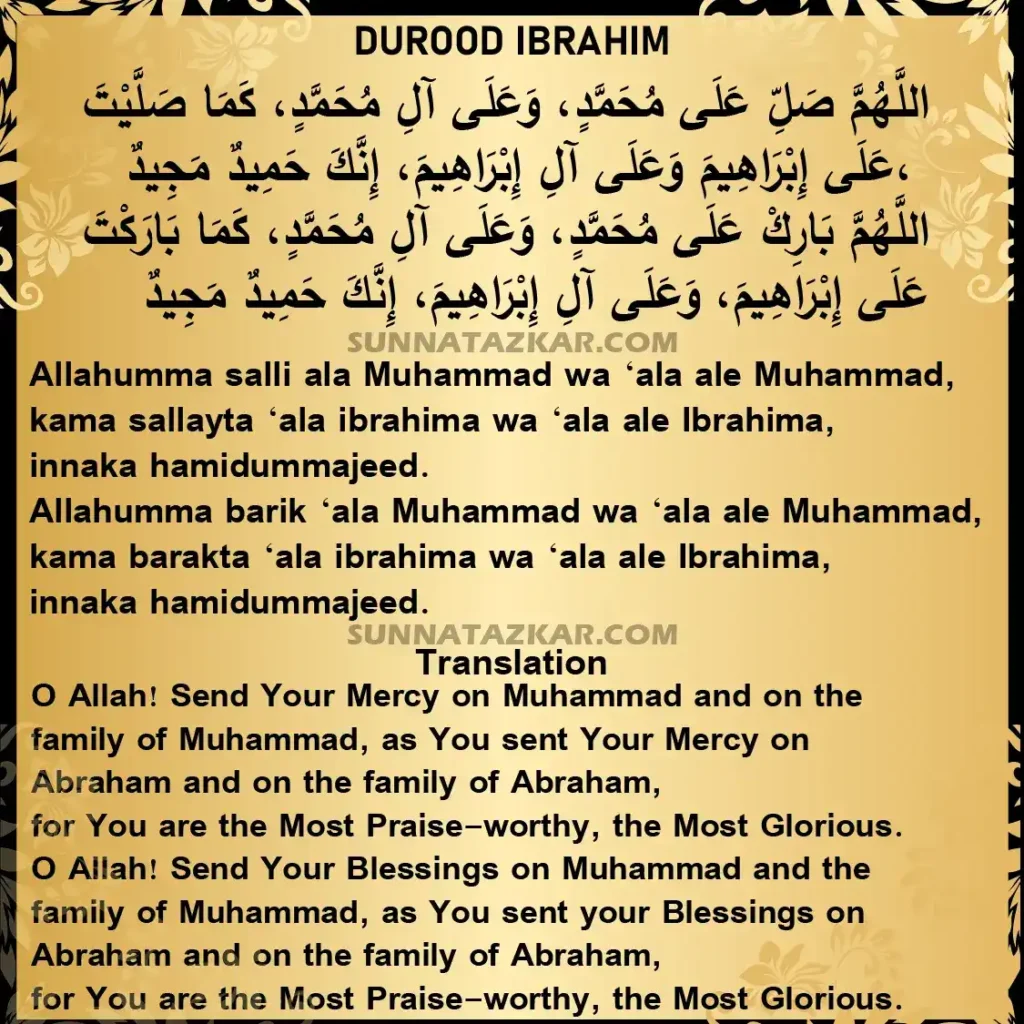
Pingback: Dua e Qunoot ya witr ki dua in Hindi - SunnatAzkar